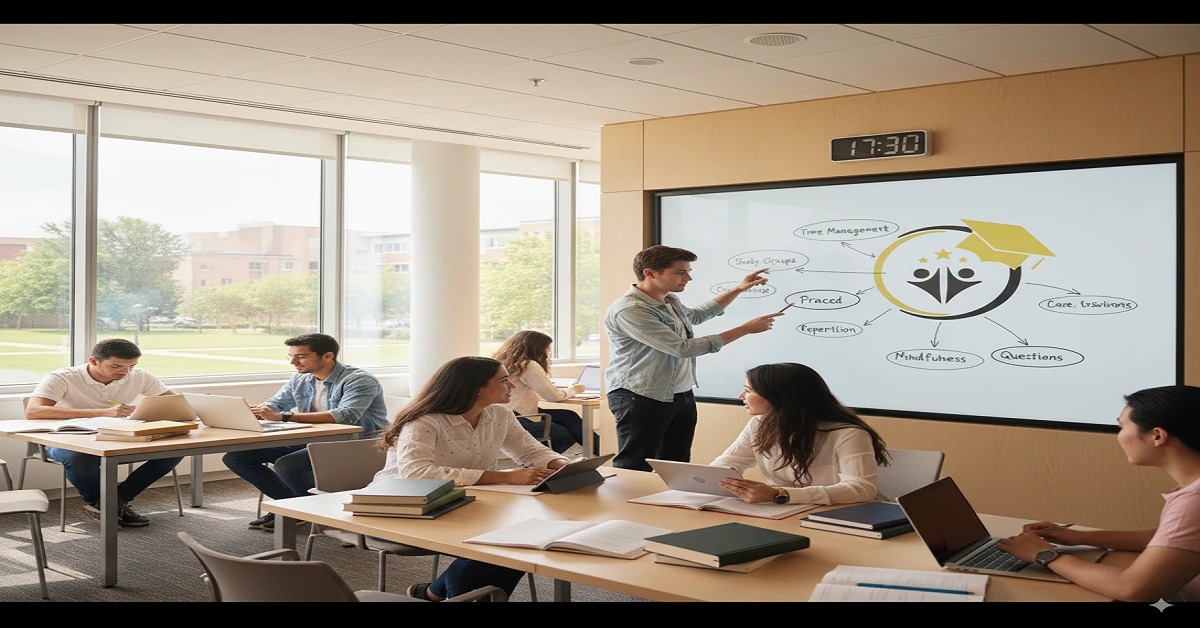Effective Strategies to Help Students Prepare for Exams and Achieve Success
Introduction
Assistance to students in preparing exams is key to their achievement. Exam pressure may be a stressful and anxious experience, but with proper advice, students can be relaxed and be able to perform to the best of their ability. In case you are asking yourself the question of “how to help students prepare for exams in short time”, then the article will be of use in your case because we are going to discuss how to assist students prepare exams. We will discuss methods of planning the study time, some techniques to use in particular subjects, and how to be focused and relaxed in the midst of preparation. Through these approaches, students will be in a position to memorize information and perform better on exams. Now, we will jump into the ideal exam preparation practices.
1. How to Help a Student Prepare for Exams
One of the factors in assisting students to prepare towards exams is to make sure that they are organized and focused. Students can become confused by the volume of material to be covered without a clear plan. Following are some of the ways on how you can help in developing a practical study plan if you are confused about how to do preparation for exam in short time.
- Create a Study Schedule: Help students allocate time for each subject, ensuring that harder subjects receive more attention. A study schedule keeps students on track and ensures they cover all topics in time.
- Set Clear Goals: Help students set specific goals for each study session. These could be as simple as mastering a particular chapter or solving a set number of practice problems. Clear goals will give them a sense of accomplishment as they progress.
- Prioritize Difficult Subjects: If a student struggles in certain subjects, make sure those areas are covered first. As they gain confidence, they can spend more time on subjects they are more comfortable with.
- Include Breaks: Remind students to take regular breaks during study sessions. This improves focus and prevents burnout. The Pomodoro Technique (study for 25 minutes, then take a 5-minute break) is a great method to follow.
2. What to Do to Prepare for an Exam
If you are thinking “how to prepare student for exams” then you need to focus not just on time management but also on how they are studying. Here’s what students can do to maximize their study effectiveness:
- Active Learning: Passive reading may not be enough to retain information. Encourage students to engage in active learning, which involves summarizing notes, teaching someone else the material, or practicing problems.
- Use Practice Tests: Encourage students to complete practice exams to familiarize themselves with the format of the questions. This not only helps them know what to expect but also gives them a chance to practice time management during the exam.
- Review Key Concepts: Students should focus on understanding the core ideas and concepts in each subject rather than memorizing everything. It’s more efficient to know how to apply key concepts than to recall isolated facts.
- Stay Organized: Help students organize their notes, textbooks, and study materials. A well-organized study space makes it easier to focus and reduces unnecessary stress.
By following these methods, students will be able to study more efficiently and effectively. Active learning and practice tests are great ways to reinforce knowledge and improve exam performance.
3. How to Prepare for Exams in Short Time
Sometimes, students find themselves with very little time to prepare for an exam. While early preparation is always preferred, here’s how students can make the most of limited time:
- Focus on High-Yield Material: In the final days leading up to the exam, help students identify the key topics that are most likely to appear on the test. This allows them to focus their energy on the most important material.
- Condense Notes: Encourage students to create summary sheets or flashcards of the most important information. This will help them review quickly and efficiently.
- Prioritize Practice: If time is tight, practicing past exams or sample questions is more important than re-reading the textbook. This helps students get familiar with the types of questions they’ll face and improves problem-solving skills.
- Avoid Cramming: Cramming often leads to stress and exhaustion, which can hinder performance. Instead, suggest a balanced approach by reviewing high-priority topics and getting adequate rest.
By focusing on key topics, condensing notes, and practicing past exams, students can still prepare efficiently for an exam even in a short time frame.
4. Exam Tips for Students
Exam day is when all the preparation comes together. It’s important for students to be mentally and physically prepared for the exam. Here are some essential exam tips for students if you thinking “What to do to prepare for an exam”:
- Get Enough Sleep: Lack of sleep can negatively affect memory and focus. Ensure that students get a full night’s rest before the exam to perform at their best.
- Eat Well: A healthy meal before the exam can help maintain energy and focus. Suggest light, balanced meals such as fruits, vegetables, and whole grains.
- Arrive Early: Encourage students to arrive at the exam venue early to avoid rushing. This will give them time to calm down, settle in, and mentally prepare.
- Read Instructions Carefully: Remind students to take time to read all the instructions carefully before starting the exam. Sometimes, the instructions may contain important details about how to approach the questions.
- Stay Calm and Positive: Remind students to stay calm and not panic if they encounter difficult questions. A positive attitude can help them think more clearly and manage their time better.
Following these tips ensures that students are physically and mentally prepared for the exam. Proper rest, nutrition, and a calm mindset are key to maximizing performance.
5. How to Prepare for Papers: Subject-Specific Strategies
Each subject requires a different approach when preparing for exams. Here are some subject-specific strategies on how to prepare for papers effectively.
- Math and Science: For subjects that involve problem-solving, like math and science, the best preparation involves practicing problems. Encourage students to solve problems from textbooks or online resources. This helps them understand the steps involved in solving each problem.
- History and Social Sciences: In subjects like history or social sciences, students should focus on understanding the key themes, events, and dates. Encourage them to create timelines, mind maps, or flashcards to summarize important facts. Discussing these topics with peers can also be beneficial.
- Literature: In literature exams, focus on analyzing key texts and understanding literary themes. Students should read the material thoroughly, take notes on important themes and characters, and practice writing essays on potential exam topics.
- Languages: For language exams, students should focus on vocabulary, grammar, and reading comprehension. Encourage them to practice speaking and writing in the language, as well as reading relevant texts to improve their fluency.
By tailoring the study approach to the specific demands of each subject, students can better prepare for the types of questions and tasks they will face in their exams.
6. How to Do Preparation for Exam in Short Time
Students may occasionally find themselves in a position where they need to prepare for an exam at the last minute. Here are some strategies for helping students with preparation for exam in short time.
- Review Key Points: If time is short, help students review the most important concepts that are likely to come up. They should focus on areas that they know are frequently tested or that have been emphasized during lectures.
- Prioritize Active Study: Active study methods like self-quizzing, explaining concepts aloud, or creating flashcards can be more effective than passive methods, like reading through notes.
- Avoid Distractions: During the short study time, it’s crucial to eliminate distractions. Encourage students to turn off their phones or any other devices that could interfere with their focus.
- Stay Calm and Focused: Remind students not to stress about the time constraint. Staying calm will help them think more clearly and retain information better.
7. General Study Tips for Students
Helping students prepare for exams goes beyond just studying hard. Here are some additional exam tips for students to ensure a well-rounded approach.
- Use Visual Aids: Encourage students to use diagrams, charts, and mind maps to make connections between different topics. Visual aids are especially helpful for subjects that require understanding complex concepts.
- Stay Organized: Ensure students keep their study materials, notes, and books organized. A cluttered study area can increase stress and distract from focused study time.
- Practice Time Management: Encourage students to practice time management both during study sessions and while taking exams. For example, they should know how long to spend on each section of the exam and ensure they leave time to review their answers.
- Ask for Help: If students encounter difficulty, remind them to seek help. Whether it’s from a teacher, tutor, or a peer, asking for clarification can make a big difference in their understanding of the material.
By incorporating these study tips, students can develop a more organized and effective approach to their exam preparation.
Conclusion
Helping students prepare for exams involves a combination of strategies, from creating a study plan to practicing effective study techniques and maintaining mental well-being. Whether students are preparing for exams in a short time or have several weeks to prepare, the key is to stay organized, focused, and positive. Encourage students to prioritize key topics, use active study techniques, and remain calm on exam day. With the right approach, every student can improve their performance and gain confidence in their abilities. Helping students prepare for exams is not just about studying harder, but studying smarter.



